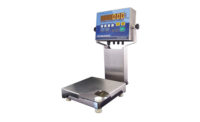Weighing is a critical step in maintaining the integrity and quality of food products. For instance, conveyor scales help in achieving consistency across all processes, assure batch uniformity, increase productivity and help processors stay competitive.
Good weighing practices
Different processes and equipment in cold food storage sites are exposed to extreme temperatures and physical factors. To cope with such unique environmental conditions, one has to practice certain measures to ensure the longevity of equipment, a seamless process and optimal outputs. Weighing scales are no different and need to be cared for. Some good weighing practices include:
· Understanding the immediate environmental conditions. Different food products require different temperatures for processing, packaging and storage. Understand how these temperatures will affect the weighing scales and take precautionary steps to protect the scales from environmental damages such as cracks, rust, pitting etc. Even the draft affects the accuracy and functioning of the weighing scales.
· Accurate calibration of the scales. Check for measurement uncertainty found in each scale. If there is a disparity in the product’s weight when weighed on an industrial scale in normal conditions to that found in the cold storage, calibrate the scales to eliminate the difference. Similarly, the weight of the food may vary at the beginning and the end of the processing line, i.e., when the food is frozen through stages. It is important to calibrate every single conveyor belt scale to achieve accurate results.
· Frequent calibration. It is not enough to just calibrate the scales. Routine testing and constant calibration are extremely crucial. With the passage of time, scales will wear down, vibrations and draft may alter reading and extreme temperature can pose damaging effects. Testing at regular intervals will help in detecting and eliminating any discrepancies.
· Thorough cleaning of the scales. In sub-zero temperatures, there is a high probability of frozen liquid being accumulated on the scales, or frozen food sticking to them. This will affect the accuracy of reading. High importance should be placed on cleaning the surfaces, without affecting the scales in any way. Use appropriate cleaning materials and techniques.
Different type of scales used in cold food industry
Cold food processors need a controlled environment for handling different food products. The factories are temperature controlled. Speed and efficiency of processes are crucial to preserving the nutrition and appearance of the food materials. Thorough cleaning and stringent hygiene measures are a part of frozen food plants. Maintenance costs also have to be controlled.
To cater to these requirements, different kinds of scales can be used, such as conveyor belt scales, bench scales and checkweighers. Scales that can be easily incorporated in the existing process lines without disruption are preferred. These scales help in preventing waste and maximize efficiency over all processes.
How a conveyor scale is useful to the industry
Conveyor scales are easy to install in any food manufacturing facility. They reduce the requirement of lifting and significantly increase throughput. These scales can be effortlessly integrated with back-office systems, scanners and printers, making it convenient to record the weight readings. They are also extremely useful in the frozen food industry.
In contact freezers, for example, food products are cooled by conduction between two cold metal plates. Scales are placed across the plates to keep a check on the weight of the food products. They are fast, efficient and compatible with conveyor scales. They are also found in cryogenic cooling of food products. This involves freezing food products moving on a conveyor belt with a nitrogen freezer. This procedure reduces dehydration losses and preserves the health of conveyor scales. Conveyor scales are present on the belts found in this process.
The food industry spans across a broad spectrum—from farming to food production to beverage production—and requires strict adherence to safety, hygiene and quality. Weighing scales ensure optimum productivity and precise compliance from farm to fork.



